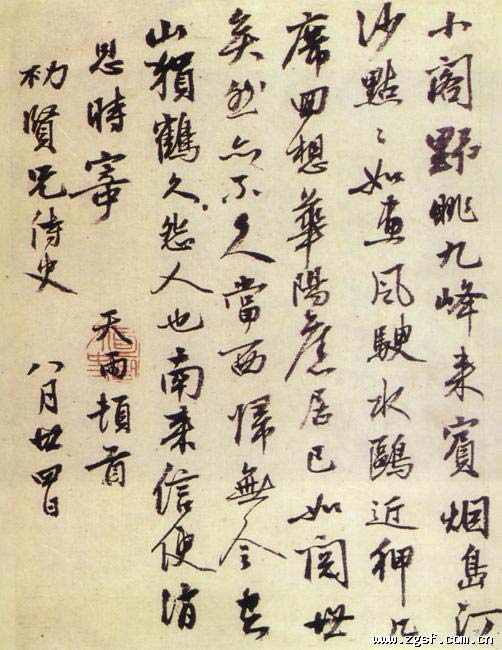Zhang Yu (1283--1350) was born in Qiantang (now Hangzhou, Zhejiang). In his early years, he was named Zezhi, with the courtesy name Boyu and Tianyu. When he was more than 20 years old, he abandoned his family and became a Taoist priest. His Taoist name was Si Zhen and his Taoist name was Zhen Juzi. Erudite and knowledgeable, good at talking about theory. He was good at poetry, calligraphy and painting. In the first year of Emperor Qing's reign (1312), at the age of 30, he climbed Maoshan (Juqu Mountain, Jurong County, Jiangsu Province), received the "Dadong Sutra", and suddenly had enlightenment, and entered the Kaiyuan Palace in Hangzhou from Wang Shouyan. In Hangzhou, Zhang Yu was able to meet Zhao Mengfu, who had returned to Wuxing to erect a monument for his ancestors, and studied calligraphy with Zhao Mengfu. The following year, Zhang Yu went to Dadu with Wang Zhenren, and became famous in Beijing for his elegant and elegant poetry. He became friendly with Zhao Mengfu, Yang Zai, Yu Ji, Fan Cheng and others in Beijing, and worshiped under Yu Ji's disciples. Soon after, Zhang Yu's father died. After returning to Hangzhou to stay in his house for three years, he resigned as the host of Fuzhen Temple in Hangzhou and went to Maoshan to study Taoism with Liu Dabin, the forty-fifth generation master of Maoshan. He once majored in "Maoshan Chronicles". At the age of sixty, he took off his Taoist robe, buried his crown and sword, returned his Confucian status, and lived in seclusion in Hangzhou. He traveled between the three Wu states and socialized and sang with scribes such as Yang Weizhen, Huang Gongwang, Ni Zan, and Yu He. Among them, under the influence of Yang Weizhen, great changes have taken place in his thoughts and life. He coveted "a moment of spring is priceless", indulged in wine and sex, and had fun. His poetry and calligraphy style in his later years tended to develop towards indulgence and wantonness. Existing writings include "Poetry Notes on Living in the Mountains", "Poems on Climbing the South Peak", "Volume of Miscellaneous Poems", etc.
Zhang Yu's poetry, calligraphy and painting were very influential in the Yuan Dynasty, and he was famous for a while. Ni Zan commented: "This dynasty is the best in Taoism." He first learned calligraphy from Zhao Mengfu. Later, under Zhao's guidance, he pursued Li Yong and involved Huai Su and Mi Fu. The style is pure and elegant, with a legacy from the Jin and Tang Dynasties. Zhang Yu has a very high book quality. He can learn from the Zhao family without being constrained by his master. He can transform the graceful and peaceful Zhao family into a divine horse and Qing Qiu. He has an obvious personal style. His works reveal the quiet, elegant and aloof character of a reclusive scholar. The breath can be glimpsed from the cursive "Poetry Volume on Paintings". Yuan Hua commented: "Mr. Zhenju's poems are clear and exquisite, and his poems naturally have an air of immortality. He is not a person among ordinary people."

Reprinted from "Cursive Notes"








